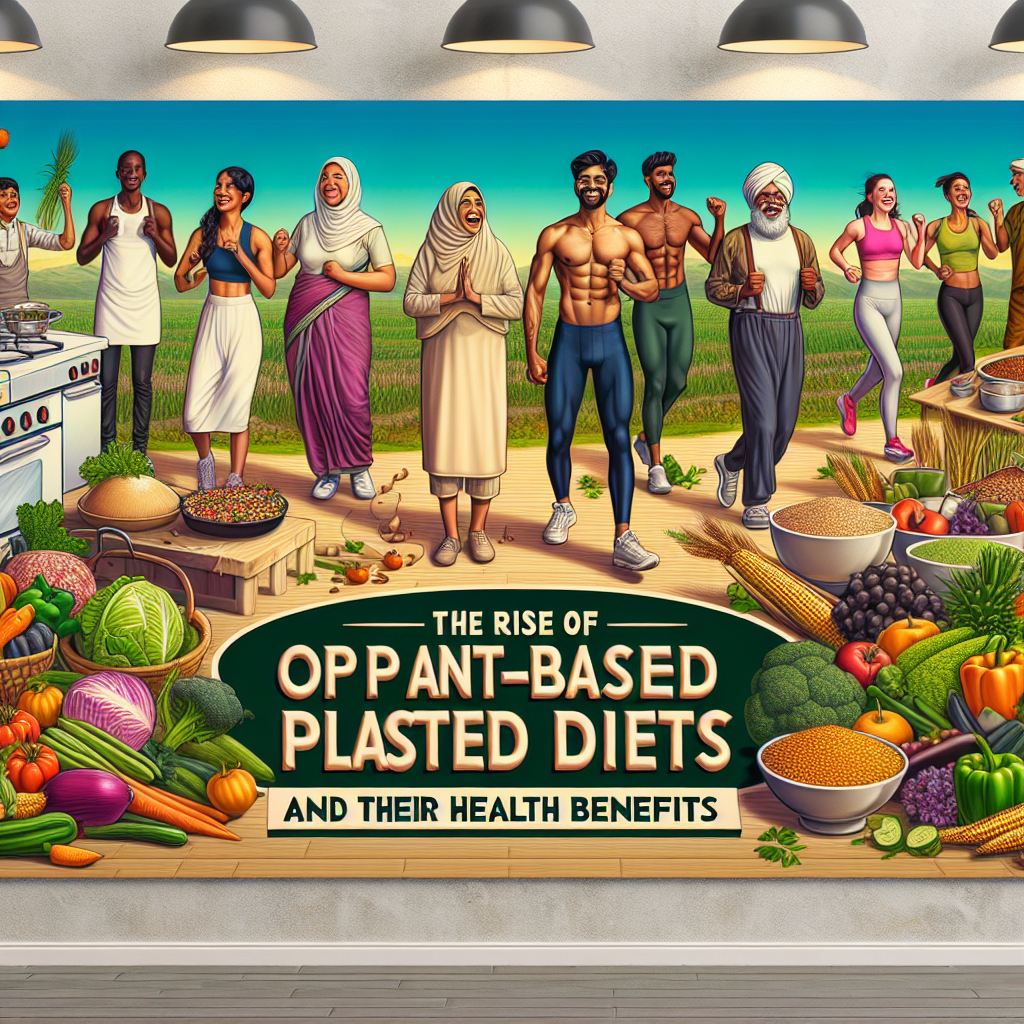The Rise of Plant-Based Diets and Their Health Benefits

Discover the health benefits of plant-based diets and join the rising trend today! Learn more about how you can improve your health and vitality with our comprehensive guide. Click here to start your journey towards a healthier lifestyle.
Exploring the Health Benefits of the Rising Trend of Plant-Based Diets
The rise of plant-based diets is a trend that has been gaining momentum in recent years. This shift towards a more plant-centric way of eating is not just a fleeting fad, but rather a conscious choice made by individuals who are increasingly aware of the health benefits associated with this dietary approach.
Plant-based diets, as the name suggests, are primarily composed of foods derived from plants. This includes not only fruits and vegetables, but also nuts, seeds, oils, whole grains, legumes, and beans. It doesn’t necessarily mean that you are vegetarian or vegan and never eat meat or dairy. Rather, you are proportionately choosing more of your foods from plant sources.
One of the most compelling reasons to adopt a plant-based diet is the potential for improved health. A wealth of research supports the idea that diets rich in plant foods, with less reliance on animal products, can lead to a lower risk of chronic diseases. For instance, a study published in the Journal of the American Heart Association found that plant-based diets are associated with a lower risk of not only heart disease, but also stroke and diabetes.
The health benefits of plant-based diets are largely due to their high content of dietary fiber, antioxidants, and other phytochemicals. Dietary fiber, found in abundance in plant foods, is known to aid digestion, help control blood sugar levels, and reduce the risk of heart disease by lowering cholesterol levels. Antioxidants and phytochemicals, on the other hand, are compounds that have been shown to have anti-inflammatory and cancer-preventing properties.
Moreover, plant-based diets are typically lower in saturated fats and cholesterol, which are often high in animal-based foods. High intake of these can lead to obesity, heart disease, and other health problems. By reducing the consumption of animal products and increasing the intake of plant foods, individuals can maintain a healthier weight and lower their risk of chronic diseases.
In addition to the physical health benefits, plant-based diets can also have a positive impact on mental health. A study published in the British Journal of Psychiatry found that individuals who consume a diet high in fruits, vegetables, and whole grains have a lower risk of depression. The researchers suggest that the nutrients found in these foods, such as B vitamins, may play a role in the production of chemicals in the brain that affect mood and other brain functions.
While the health benefits of plant-based diets are clear, it’s important to note that simply eliminating animal products from one’s diet does not automatically make it healthy. A well-planned plant-based diet that includes a variety of foods is necessary to ensure that all nutritional needs are met. This includes adequate intake of protein, iron, calcium, and vitamin B12, which are nutrients that are often associated with animal products.
In conclusion, the rise of plant-based diets is a trend that is backed by a growing body of scientific evidence highlighting its health benefits. From reducing the risk of chronic diseases to improving mental health, the benefits of a plant-based diet are manifold. As more people become aware of these benefits, it’s likely that the popularity of plant-based diets will continue to grow. However, it’s crucial to remember that a balanced and well-planned diet is key to reaping these health benefits.
The Rise of Plant-Based Diets: A Deep Dive into Their Health Advantages

In recent years, there has been a significant shift in dietary habits across the globe, with an increasing number of individuals opting for plant-based diets. This trend is not merely a fad but a conscious choice made by many, driven by a myriad of reasons ranging from health benefits to environmental sustainability. The rise of plant-based diets is a testament to the growing awareness and understanding of the profound impact that our food choices can have on our health and the environment.
Plant-based diets primarily consist of foods derived from plants, including fruits, vegetables, grains, nuts, seeds, and legumes, with little to no animal products. The health advantages associated with these diets are manifold and backed by a growing body of scientific evidence.
One of the most compelling health benefits of plant-based diets is their potential to prevent, manage, and even reverse chronic diseases. A diet rich in plant foods is high in fiber, antioxidants, and other phytochemicals, which have been shown to reduce the risk of developing heart disease, diabetes, and certain types of cancer. For instance, the fiber in plant foods helps to lower cholesterol levels, regulate blood sugar, and promote a healthy gut microbiome, thereby reducing the risk of heart disease and type 2 diabetes. Similarly, the antioxidants and other phytochemicals found in fruits and vegetables can help to protect against cancer by neutralizing harmful free radicals and inhibiting the growth of cancer cells.
In addition to disease prevention, plant-based diets can also contribute to weight management and overall wellness. Plant foods are typically lower in calories and fat compared to animal products, making them a healthier choice for those looking to maintain a healthy weight or lose excess pounds. Moreover, the high fiber content of plant foods can help to promote feelings of fullness, thereby preventing overeating and aiding in weight control. Furthermore, a diet rich in plant foods can also provide ample amounts of essential nutrients, including vitamins, minerals, and healthy fats, which are crucial for optimal health and well-being.
Beyond the direct health benefits, plant-based diets can also have a positive impact on the environment. The production of plant foods generally requires less land, water, and energy compared to the production of animal products, thereby contributing to lower greenhouse gas emissions and less environmental degradation. Thus, by choosing a plant-based diet, individuals can not only improve their health but also contribute to the sustainability of our planet.
In conclusion, the rise of plant-based diets is a promising trend that reflects a growing recognition of the power of food as medicine. The health benefits of these diets, from disease prevention to weight management, are substantial and well-documented. Moreover, the environmental advantages of plant-based diets further underscore their value in promoting a healthier and more sustainable future. As more and more people embrace plant-based diets, it is hoped that this will lead to a paradigm shift in our food system, where healthful and sustainable food choices become the norm rather than the exception.
Understanding the Health Implications of the Growing Popularity of Plant-Based Diets
The rise of plant-based diets has been nothing short of phenomenal in recent years. This surge in popularity is not merely a fleeting trend, but rather a significant shift in dietary habits that is driven by a growing awareness of the health benefits associated with plant-based eating. As more people embrace this lifestyle, it is crucial to understand the health implications of plant-based diets.
Plant-based diets, which primarily consist of fruits, vegetables, grains, nuts, and seeds, have been associated with a myriad of health benefits. These diets are rich in fiber, vitamins, and minerals that are essential for optimal health. They are also low in saturated fats and devoid of cholesterol, which are commonly found in animal-based foods. This unique nutritional profile of plant-based diets has been linked to a reduced risk of developing chronic diseases such as heart disease, diabetes, and certain types of cancer.
One of the most compelling health benefits of plant-based diets is their potential to prevent and manage heart disease. Numerous studies have shown that individuals who follow a plant-based diet have lower cholesterol levels, lower blood pressure, and a reduced risk of heart disease compared to those who consume animal-based foods. This is largely due to the high fiber content and the presence of heart-healthy nutrients such as potassium and antioxidants in plant-based foods.
In addition to heart health, plant-based diets have also been shown to be beneficial for maintaining a healthy weight. Plant-based foods are generally lower in calories and higher in fiber compared to animal-based foods. This means that individuals who follow a plant-based diet can feel full and satisfied while consuming fewer calories, which can aid in weight management and prevent obesity.
Furthermore, plant-based diets can play a significant role in managing and preventing diabetes. The high fiber content in plant-based foods can help regulate blood sugar levels by slowing down the absorption of sugar into the bloodstream. This can help prevent spikes in blood sugar levels, which is particularly beneficial for individuals with diabetes.
The potential of plant-based diets to reduce the risk of certain types of cancer is another noteworthy health benefit. Some studies have suggested that a high intake of fruits and vegetables can lower the risk of developing certain cancers, including breast and colon cancer. This is likely due to the abundance of antioxidants and other cancer-fighting compounds found in plant-based foods.
Despite the numerous health benefits associated with plant-based diets, it is important to note that these diets need to be well-planned to ensure nutritional adequacy. Some nutrients, such as vitamin B12 and omega-3 fatty acids, are primarily found in animal-based foods and may need to be supplemented in a plant-based diet.
In conclusion, the rise of plant-based diets is a testament to the growing recognition of the health benefits associated with this way of eating. From heart health to weight management and disease prevention, plant-based diets offer a multitude of health benefits. However, like any diet, it is important to ensure that a plant-based diet is balanced and nutritionally adequate. With proper planning and a variety of plant-based foods, it is possible to reap the health benefits of this dietary approach while enjoying a diverse and satisfying diet.